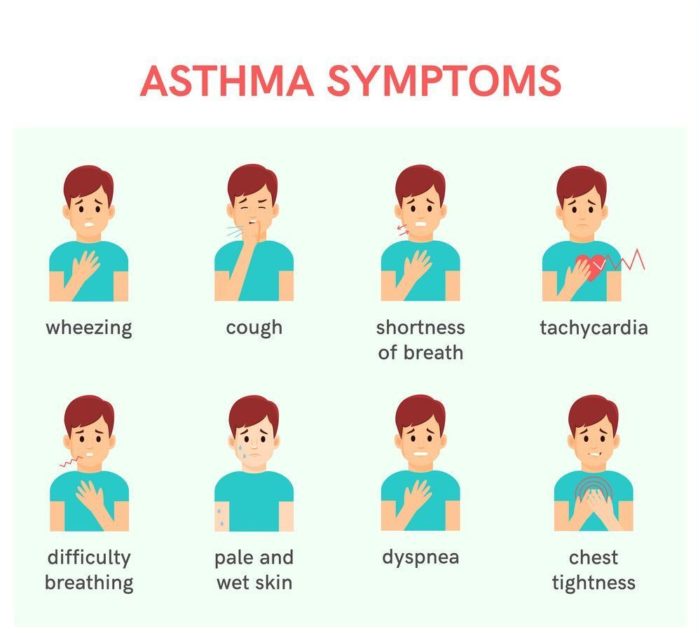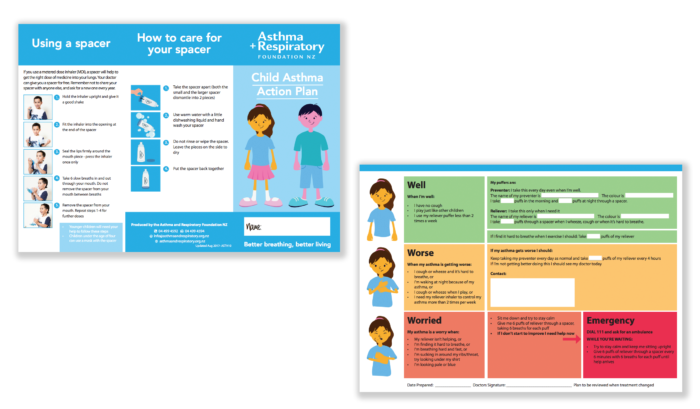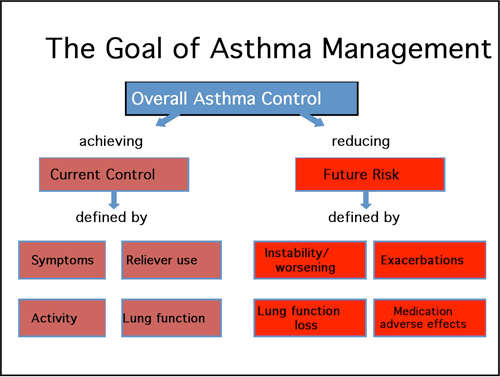Recognizing and Understanding Common Asthma Symptoms
Astonishingly, the manifestations of asthma can perplexingly differ from one individual to another. However, amidst this intricate variability, there exist certain telltale signs that one should be alert for. The sound of wheezing, akin to a melodious yet disconcerting whistle, emerges as an iconic symptom of asthma when an afflicted person breathes. Concomitantly, episodes of breathlessness and a distressing sensation of tightness in the chest are commonly encountered indicators of an impending asthma attack. Furthermore, if bouts of coughing persistently occur during nocturnal hours or after engaging in physical exertion, it may serve as yet another ominous sign that your airways have succumbed to inflammation.

It is paramount to comprehend these bewildering symptoms thoroughly so as to effectively manage the burdensome condition known as asthma. By unraveling the enigmatic triggers behind your unique set of symptoms and devising a comprehensive action plan tailored specifically for you, you shall seize control over this capricious ailment. A meticulously crafted blueprint for asthmatic management typically encompasses various components such as diligently identifying potential allergens (such as pesky pollen particles or treacherous pet dander), conscientiously avoiding irritants (ranging from noxious smoke to pungent odors), and vigilantly safeguarding against respiratory infections.
Nevertheless, it would be remiss not to acknowledge that each asthmatic soul possesses their own idiosyncratic constellation of triggers and severity levels pertaining to their affliction. Some individuals find themselves ensnared within the clutches of severe asthma – a more formidable manifestation demanding personalized treatment regimens involving potent medications wielded solely at combating its ferocity head-on. Irrespective though; regardless if your particular brand of asthma beseeches unrivaled strength or manifests with somewhat less intensity on this enigma-infested spectrum – harmonizing closely with your trusted healthcare provider will undoubtedly facilitate optimal control over your asthmatic struggles, effectively minimizing the perils of succumbing to an asthma attack.
Developing an Effective Asthma Management Plan
Having a written asthma action plan is an integral part of effectively managing your condition. Collaborating with your doctor to develop this plan ensures that you are equipped with the necessary steps to control your asthma and respond appropriately when symptoms worsen. This comprehensive document provides valuable information about which medications to take, when and how often to use them, as well as clear indicators signaling the need for medical attention. By diligently adhering to this strategic plan, you can successfully navigate the complexities of living with asthma while minimizing its impact on your daily life.

Furthermore, there are additional measures one can take in order to maintain control over their asthma. Identifying and avoiding triggers that have the potential to exacerbate symptoms is a crucial step towards achieving this goal. Common culprits such as dust mites, pollen, pet dander, and mold should be minimized through regular cleaning routines or by utilizing air filters within your living space. By reducing exposure to these triggering elements, you can significantly decrease the likelihood of experiencing respiratory distress such as persistent coughing or breathlessness.
Regular check-ups and open communication with healthcare providers play a pivotal role in effectively managing asthma. These visits allow for adjustments in treatment plans if deemed necessary by medical professionals based on individual needs. Depending on the severity of your condition, long-term control medication may be prescribed or alterations in dosage may be recommended by your doctor. The effectiveness of these treatments will be monitored through lung function tests and evaluations of changes in symptom frequency or severity over time. Taking proactive measures by actively engaging in proper medical care enables individuals suffering from asthma to seize control over their chronic respiratory condition without allowing it to impede upon their day-to-day activities
Identifying and Avoiding Asthma Triggers
Managing asthma requires identifying and avoiding triggers, a crucial but perplexing task. Each person’s experience with asthma differs, making it challenging to pinpoint the exact factors that exacerbate symptoms. While allergens like pollen, dust mites, and pet dander are common culprits, some individuals may react strongly to specific foods or environmental irritants. Consulting with an asthma specialist is advised to unravel this burst of uncertainties.
By seeking guidance from a healthcare provider well-versed in managing asthma, you can gain personalized insights tailored to your unique needs. They might suggest using a peak flow meter for regular lung function monitoring or maintaining a diary of symptoms and potential triggers. Furthermore, they will furnish valuable health information encompassing preventive measures and treatment options for both allergic and non-allergic forms of asthma.
The Centers for Disease Control (CDC) also offers resources brimming with assistance in formulating an effective asthma management plan. Their website serves as an extensive repository elucidating how one can steer clear of known triggers such as tobacco smoke, air pollution, potent odors or chemicals, frigid air temperatures that induce bronchoconstriction during exercise (EIB), and respiratory infections. By incorporating these precautions alongside your healthcare provider’s counsel into your arsenal against asthma, you seize control over its bewildering labyrinth while mitigating the risk of acute episodes.
Bear in mind that although no cure currently exists for asthma; proper identification and avoidance of triggers stand as indispensable pillars in disease management. Actively striving to shield yourself—and especially children suffering from this chronic condition—from substances instigating asthmatic responses can significantly diminish the frequency and severity of associated symptoms—a constant battle worth fighting fervently against this enigmatic ailment.
Taking Control of Asthma with Medications
Asthma management holds immense importance for individuals grappling with asthma and allergies. Crafting an asthma management plan serves as a means to curtail asthma attacks and enhance overall well-being. Among the most prevalent symptoms of asthma lies wheezing, which arises when airways constrict, making breathing arduous. Medications play a pivotal role in controlling these symptoms.
An array of medications exists to treat asthma, ranging from quick-relief options to long-term control alternatives. Quick-relief medications swiftly alleviate distress during an asthmatic emergency by relaxing the muscles encircling the airways, facilitating smoother airflow. In contrast, long-term control medications aid in managing persistent inflammation within the airways, forestalling future flare-ups.
Adhering unwaveringly to the prescribed medication regimen outlined in your personalized asthma management plan assumes paramount significance. Such commitment bolsters symptom control while diminishing the likelihood of encountering severe episodes that may necessitate hospitalization or even prove fatal. Grasp firmly that steadfast adherence to medication significantly enhances life quality by mitigating both frequency and severity of asthmatic bouts.
By comprehending how these medicines function and faithfully abiding by recommended usage guidelines laid out by healthcare professionals or established asthma protocols, you can effectively seize command over your condition. Consistently monitoring symptoms alongside close collaboration with medical practitioners ensures prompt adjustments if necessary. Pairing appropriate medicine utilization with preventive measures such as steering clear of known triggers liable to exacerbate asthmatic occurrences imparts gratifying health while successfully managing this chronic respiratory ailment
Understanding the Role of Allergies in Asthma
Asthma, a perplexing disease that bewilderingly affects the airways by inexplicably causing inflammation and constriction. It is an enigmatic condition where allergies seem to hold sway as one of the key factors. The mere thought of allergies can unleash a burst of symptoms, like an unpredictable storm, thrusting individuals with asthma into distress. Thus, it becomes crucial for these afflicted souls to unveil and evade their own unique triggers. Should you harbor suspicions about the role allergies play in your or your child’s asthmatic plight, it is of utmost importance to beseech your doctor for allergy testing.
Within this intricate web of asthma lies a tangled array of common symptoms: coughing, wheezing, shortness of breath, and chest tightness. Yet amidst this labyrinthine complexity lie allergens – those mischievous culprits responsible for igniting similar manifestations such as pollen-induced turmoil or dust mite-generated havoc within our respiratory sanctuaries. To unravel which specific allergens contribute to yours or your child’s asthmatic woes holds great promise in seizing control over this capricious condition.
To embark on this quest for understanding if allergies truly wield influence over yours or your child’s asthmatic fate requires guidance from healthcare professionals who specialize in treating respiratory conundrums. Entrusting them with these mysteries will grant access to invaluable resources and tools designed to navigate both the treacherous realms of allergies and asthma simultaneously. This expedition may encompass long-term control medications or even crafting a meticulous action plan tailored specifically to you or your child’s needs when symptoms reach their zenith.
Bear in mind that comprehending the interplay between allergies and asthma marks but one stride toward gaining dominion over this chronic adversary. By forging an alliance with healthcare providers hailing from esteemed departments dedicated solely to unravelling mysteries surrounding respiratory diseases – seeking solace within their knowledge banks while relentlessly posing queries about available treatment options tailored to your or your child’s unique circumstances – the ultimate goal of asthmatic episode management shall be realized.
What are some perplexing indications of asthma?
Perplexing indications of asthma encompass wheezing, breathlessness, a constrictive sensation in the chest, and bouts of coughing, particularly during nocturnal hours or the early morning.
How can I cultivate an efficacious plan for managing asthma?
To cultivate an efficacious plan for managing asthma, it is imperative to forge a closely-knit partnership with your healthcare provider. They will aid you in discerning triggers, prescribing medications tailored to your needs, and instructing you on how to vigilantly monitor and navigate your symptoms. Regularly reassessing and enhancing your plan holds paramount importance as well.
How can I identify and evade triggers that spur on my asthma?
Identifying and eluding triggers that instigate asthmatic episodes plays a pivotal role in effectively tending to your condition. Common culprits comprise allergens (such as pollen, dust mites, and pet dander), smoke waftings, potent odors permeating the air around you, frigid temperatures assaulting your lungs’ delicate equilibrium , strenuous physical activity wreaks havoc on respiratory stability ,as do respiratory infections invading within . Maintaining a comprehensive diary chronicling both symptoms experienced as well their potential catalysts would facilitate identification while aiding avoidance endeavors.
What pharmacological interventions exist for constraining manifestations of asthma?
A wide array of pharmacological interventions exists to curtail manifestations associated with asthma. Inhalers (e.g., bronchodilators and corticosteroids), oral medications administered orally,and allergy shots all form part of this armamentarium . Your healthcare provider will judiciously prescribe medication(s) most suited to cater specifically to your unique requirements.
In what manner do allergies contribute towards exacerbating asthmatic tendencies?
Allergies maintain close-knit ties with incidences of asthma. In certain individuals, exposure to allergens serves as a catalyst prompting asthmatic symptoms or exacerbating pre-existing ones. This phenomenon is commonly referred to as allergic asthma. By effectively tending to allergies through avoidance techniques, judicious medication usage ,or immunotherapy regimens, one can successfully rein in the manifestation of distressing asthma symptoms

